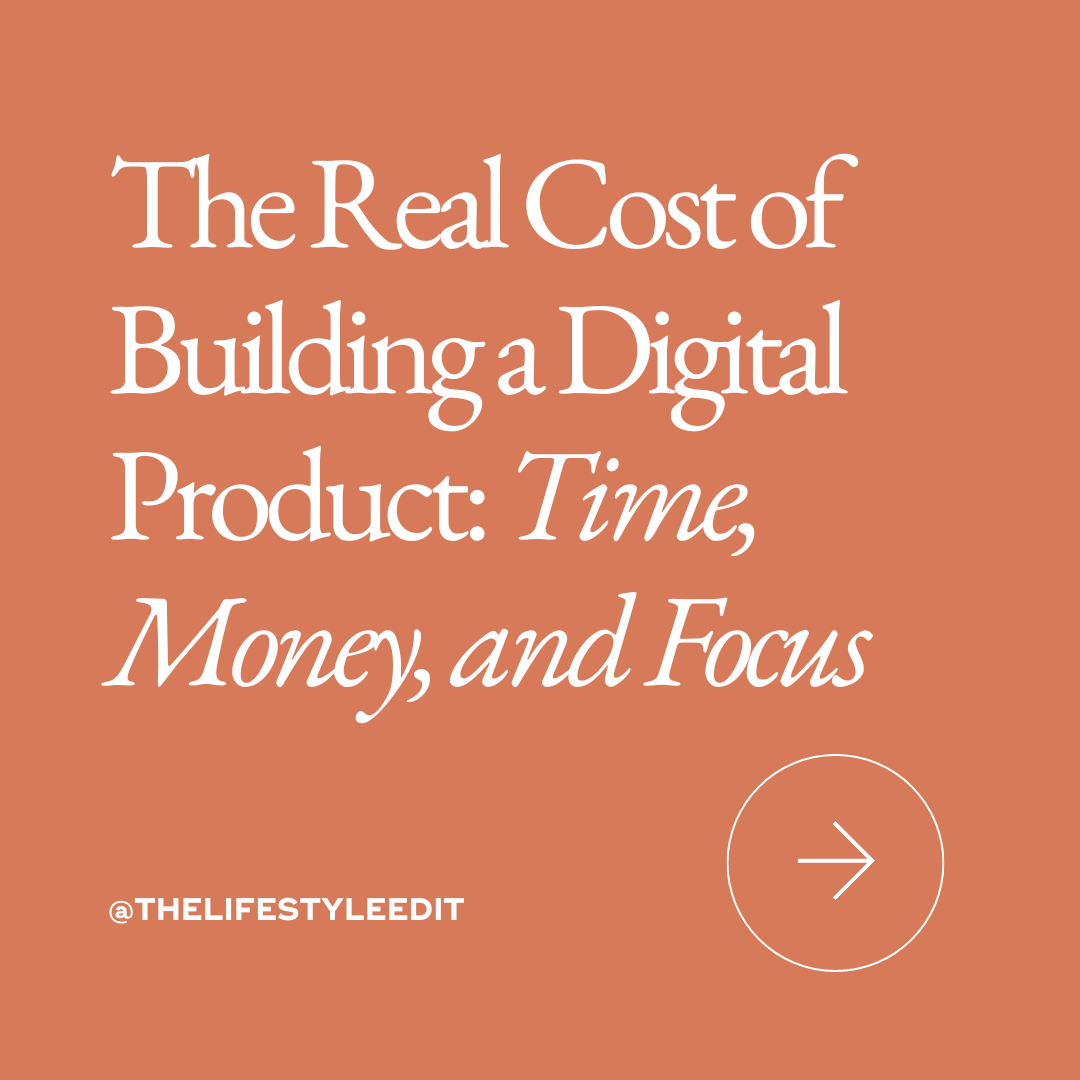Discover the hidden costs of building a digital product and how to manage your resources wisely for long-term success.
Building a digital product can seem like a dream come true.
It offers the potential for scalable income, less time spent in one-on-one services, and a way to share your expertise with a wider audience.
But the truth is, creating and scaling a digital product requires significant resources—far more than most people anticipate.
Before diving into digital products, it’s crucial to understand the real cost, not just in terms of money, but in time, energy, and focus.
In this post, I’m going to break down those hidden costs so that you can make informed decisions and avoid burnout while building a digital product that aligns with your long-term business vision.
The Investment of Time: It’s More Than You Think
One of the biggest misconceptions about building a digital product is that once you create it, it will essentially sell itself. While the idea of “set it and forget it” sounds appealing, the reality is much more complex.
1. Curriculum Development Takes Time
Creating a digital product isn’t just about throwing your ideas into a few modules and calling it a day.
The real work comes in developing a structured curriculum that provides a clear transformation for your students. This involves:
- Mapping out the customer journey and making sure your product delivers on its promises.
- Structuring your content in a way that’s easy to follow and digest.
- Revising and refining your content to ensure it’s valuable and actionable and applies to the different subsets of your audience.
If you’re thoughtful about this process, it takes a significant amount of time to plan, test, and fine-tune before you even begin creating the content.
2. Creation Is Just the Beginning
Once you’ve nailed down the curriculum, the content creation process begins.
Recording videos, writing workbooks, creating slide decks, and designing course platforms all take time.
And even once your digital product is launched, the work doesn’t stop there.
You’ll likely need to update the content, adjust it based on feedback, and continue optimizing your product as you go.
3. Marketing and Sales Require Ongoing Attention
While building the digital product is an initial time investment, marketing and selling it is an entirely separate project that requires ongoing attention.
Without consistent marketing efforts, your digital product can easily become stagnant.
This includes setting up funnels, creating sales events, refining your messaging, and continuously testing and tweaking your approach.
The Financial Costs: More Than Just a One-Time Investment
When you think about building a digital product, you might assume that the upfront costs are limited to the creation process.
However, there are hidden financial costs involved that you need to consider to sustain the project long-term.
1. Tools and Platforms
Building a high-quality digital product requires the right tools, whether it’s for course creation, hosting, or marketing. You’ll need to invest in:
- A course hosting platform like Kajabi or Teachable.
- Email marketing tools to build and nurture your list.
- Ad spend if you’re using paid marketing to drive traffic.
These costs can quickly add up and are ongoing, not one-off expenses. The more you scale, the more you’ll likely need to invest in advanced tools and automation to support growth.
2. Team Support
Depending on your capacity, you may need to hire support to help with the creation process, marketing, and customer service. As you move further into scaling, things like copywriting, tech setup, and ad management may require outside expertise. The reality is that it’s difficult to do everything on your own while maintaining the quality and attention your business deserves.
3. Pre-Selling Isn’t Always a Sustainable Solution
While pre-selling your digital product can help offset some of these initial costs, it’s important to remember that pre-sales are typically a one-time cash injection.
It can give you some immediate breathing room, but it’s not a long-term solution for funding the ongoing development and marketing of your product.
The Mental Focus: Managing Capacity Without Burnout
Creating a digital product is not just about money and time. The mental and emotional capacity required is often overlooked but is equally important to consider.
1. Shifting Focus From Client Work to Product Creation
One of the hardest shifts for many business owners is learning how to balance the creation of a digital product with ongoing client work.
This can feel overwhelming, especially if you’ve built your business around one-on-one services.
Reducing your client load to create space for building the product may also mean reducing your income temporarily.
2. The Pressure of Results
When you start building a digital product, it’s easy to feel the pressure of making it a success.
After all, you’re investing a lot of time and money into this offer, and it can be stressful waiting for results, especially if they don’t come immediately.
Why Locking In Recurring Income First Is Crucial
Given the amount of time, money, and focus required to create a digital product, I strongly recommend having recurring income from a high-ticket offer before diving into product creation.
As I teach inside Life-First Business, recurring income gives you the financial stability to build your product without feeling pressured by cash flow dips or the uncertainty that can come from scaling a new offer.
When you have recurring income in place, you have the capacity to focus on building your digital product without spreading yourself thin.
You can invest the necessary time, money, and focus, knowing that your foundational income is secure.
Building a digital product is an exciting step, but it’s essential to go into it with your eyes wide open.
The real cost of building and scaling a digital product isn’t just the time and money spent upfront—it’s the ongoing commitment to marketing, refining, and managing your energy to ensure that your business remains sustainable.
If you’re thinking about building a digital product, start by securing your recurring income first.
That way, you can build with confidence, knowing that your business has the foundation it needs to grow sustainably over time.







